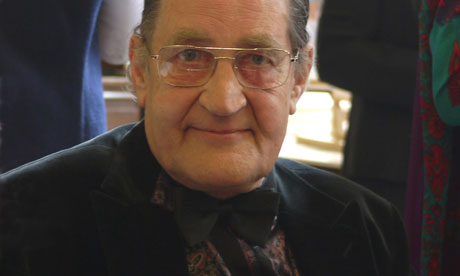
Paul Kriwaczek, who has died aged 73, was a communicator with great presentational flair. A producer of educational television and, subsequently, a writer about ancient civilisations, he used his vast store of knowledge to explain by metaphor, analogy and models. His last book, Babylon, Mesopotamia and the Birth of Civilisations (2010), began by describing the execution of Saddam Hussein in the style of the Old Testament Book of Kings, to show how the dictator saw himself as the successor to Nebuchadnezzar. In the TV series that introduced the computer to the British household, The Computer Programme (1981), the studio presenter explained the picture format of analogue TV, while his woollen sweater was being unwound line by line from his person.
Paul joined BBC Further Education TV in 1970. Any subject seemed possible, provided the programmes were in series, accompanied by a booklet and made on the cheap. With the early music pioneer David Munrow, he made Ancestral Voices, a history and ethnography of musical instruments (1974). In Bellamy's Backyard Safari (1982), he reduced Professor David Bellamy to a millimetre in height to explore the botany of his back garden. With the conductor Jane Glover, he dramatised the life of Mozart for a TV musical biography (1986).
Three series proved particularly effective. Paul wrote Parosi (Neighbours, 1975), the first Indian soap opera on British TV, about a family of Asian immigrants who all benefited from learning English. The BBC Computer Literacy Project, of which Paul was a founder member, led to a surge of interest in programming and technical innovation. In 1993, Paul was the brains behind Living Islam, one of the few popular TV attempts to explain how Islam is practised worldwide.
Paul then left TV and embarked on his histories. In Search of Zarathustra: The First Prophet and the Ideas that Changed the World (2002) related his exploration of the origins and continuing influence of Zoroastrianism. He was most proud of Yiddish Civilisation: The Rise and Fall of a Forgotten Nation (2005), which tried to "rescue the Yiddish past from its oblivion". He made the controversial point, though increasingly accepted, that many of the Jews of middle Europe were descended not from the diaspora but from conversions among their Slavic neighbours. Then came his Babylon book.
Paul was born to Jewish parents in Vienna and imprisoned with his mother by the Nazis at the age of two. How Alice escaped, rescued her husband Oscar from Dachau and delivered her family safely to England, she revealed in an interview for the Imperial War Museum. Paul told me he could not bear to listen to it.
He went to Kilburn grammar school, north-west London, arriving with a trumpet in his pocket and soon displaying artistic abilities. As a schoolboy actor, he appeared, for example, in Powell and Pressburger's The Battle of the River Plate (1956), with Peter Finch. As a stage writer, he had his first success with an adaptation of Bertholt Brecht's Herr Puntila and His Manservant Matti for the Royal Shakespeare Company.
Persuaded by his engineer father that he needed a steady career, he chose dentistry, because he thought it required less commitment than medicine. A Jewish charity paid for his study at the London hospital medical school, and he practised in central Asia and southern Africa, assisted by his wife, Jeannette Parsons, whom he married in 1966. In Kabul, the Afghan royal family were among their patients.
Paul spoke many languages in a most mellifluous voice; using his own code of phonetic pronunciation, he became a foreign-language coach for actors. He played several musical instruments, primarily the alto saxophone, but also including a "string organ" that he patented. His flair for presentation extended to his everyday life: he designed his own clothes in the central Asian style, and his hallmark headgear was a woollen cap that he had designed, spun, dyed and woven himself. His conversation ranged over a vast intellectual terrain, delighting in cross-cultural perspectives, and was always as entertaining as it was challenging.
A gentle, diffident but pedagogic friend and father, Paul passed on his interests to his sons, Rohan and Tamor, and daughter, Nandi. They and Jeannette survive him.
• Paul Kriwaczek, television producer and writer, born 30 November 1937; died 2 March 2011

